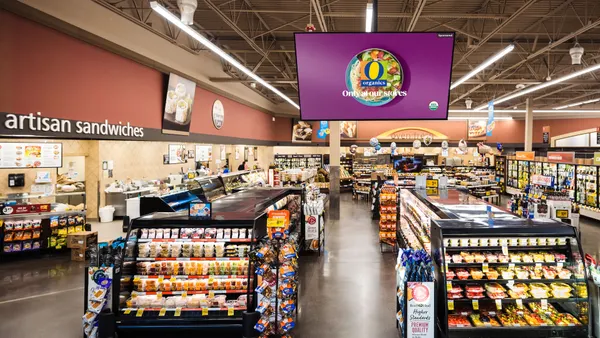Brief:
- Apple reported spending at its App Store rose 37% to $1.22 billion during the seven-day period starting on Christmas Eve, compared to a year earlier, according to a company announcement. New Year's Day sales rose 7.3% from 2018 to a single-day record of $322 million.
- Multiplayer games including the buzzed-about "Fortnite" and "PUBG" were among the top downloaded games during the holidays, in addition to "Brawl Stars," "Asphalt 9" and "Monster Strike," per Apple's announcement.
- The company didn't disclose 2018 earnings for iOS developers, as it had for 2017 when earnings totaled $26.5 billion and for 2016 when they reached $20 billion. Apple is expected to announce results for the quarter that ended on Dec. 29 next month. The iPhone maker this week took the rare step of cutting its quarterly sales estimates, citing a significant slowdown in China.
Insight:
Apple's App Store remains a strong driver of revenue growth for the company as it confronts softening demand for the iPhone, which is responsible for about 60% of revenue. Apple doesn't provide breakdowns of App Store sales, grouping them in its broader "services" category that also includes Apple Music, iTunes, AppleCare product warranties, iCloud storage and Apple Pay. A year ago, the services category grew 18% in fiscal Q1 2018, which included the holiday season. CEO Tim Cook had previously set a goal of making $50 billion in annual services revenue by 2020.
While services make up Apple's fastest-growing category, they're unlikely to make up for billions in lost sales in China. Apple needs more iPhones operating in China to drive growth in ancillary services like the App Store. Unfortunately for Apple, Chinese consumers have demonstrated far less loyalty than American customers show for the Apple brand. While 90% of American consumers will stick with Apple, only 60% of Chinese mobile customers plan to get an iPhone as their next smartphone, according to Aurora Mobile data cited by The Wall Street Journal.
Apple faces greater competition from local Chinese brands with improved features such as camera quality. Rivals like Huawei and Xiaomi sell phones at an average price of less than $300, compared with $900 for Apple's smartphones. Meanwhile, Chinese consumers tend to be more loyal to apps than to mobile platforms like Android or Apple's iOS. WeChat, the messaging app developed by Chinese tech giant Tencent, acts like a self-contained operating system on any phone, with features that include voice calls, payments, food ordering, ride-hailing and social media. That makes it easier for WeChat customers to switch phones while maintaining the continuity of their accounts, The Wall Street Journal reported.
The fact that "Fortnite" was a top downloaded game could be worrisome for Apple as the game's developer Epic looks to develop its own app store. A related concern for Apple is Netflix's recent decision to collect subscription revenue directly rather than through the App Store. While the move likely will save the video streaming giant hundreds of millions of dollars a year, the effect on Apple's annual services revenue is likely to be minimal. Apple's services revenue grew 24% to $37.1 billion in 2018, while iPhone sales rose 18% to $166.7 billion, according to a regulatory filing.










